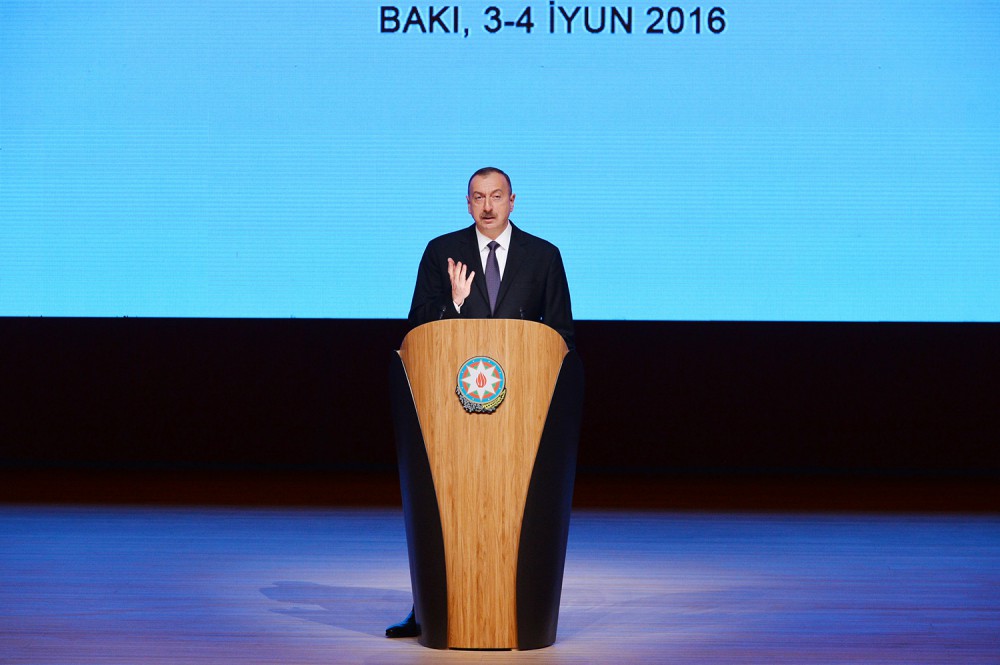Baku, Azerbaijan, June 3
Trend:
Azerbaijani army has liberated not 800 hectares, but 2,000 hectares of territories from the occupants, Azerbaijan's President Ilham Aliyev said addressing the 4th Congress of World Azerbaijanis in Baku June 3.
President Aliyev noted that over 2,000 hectares of territories have been liberated from the occupants in Aghdere, the administrative territory of the former Nagorno-Karabakh Autonomous Oblast, Fizuli and Jabrayil districts.
"Currently, the Azerbaijan army controls several times larger territory and the Armenian army can't move there," said the president.
The president pointed out that Armenia was the instigator of the April battles, because it doesn't want peace.
When Armenia saw increasing pressure on it regarding the peaceful settlement of the conflict, changing the status quo which means the withdrawal of Armenian troops from the occupied lands, it resorted to provocations, said President Aliyev.
"They were attacking our positions before the April battles as well, and not only on the line of contact, but in the other direction, in Gazakh, our serviceman was killed," he said. "They were constantly shelling our villages, launching attacks on our territories."
The president recalled that in 2014, Armenians staged another provocation: Armenian military helicopter violated the airspace on the contact line.
"The helicopter was shot down and Armenians used this as a pretext. The talks were frozen for a year. That is, Armenians always resort to provocations when they see increasing pressure on them," he added.
President Aliyev said the April battles were the similar kind of provocation, adding that the Azerbaijani army gave an adequate response and stopped the enemy.
President Aliyev noted that after these clashes, Azerbaijan carried out a counteroffensive and immediately gained the needed positions.
"After this, the Armenian army attempted to regain those positions throughout 2-3 days. Seeing that they can't succeed, suffer losses and if they do not stop, they will lose more territories, Armenians appealed to Russia," said Azerbaijan's president.
President Aliyev noted that the chief of General Staff of Russian Armed Forces made a phone call to the chief of General Staff of Azerbaijani Armed Forces, saying that Armenia asks for restoring the ceasefire and invited the chief of General Staff of Azerbaijani Armed Forces to talks in Moscow.
"After this, Russia's president made a phone call to me and put forward the same proposal - to restore the ceasefire and we agreed to restore the ceasefire on April 5," said the president.
On the night of April 2, 2016, all the frontier positions of Azerbaijan were subjected to heavy fire from the Armenian side, which used large-caliber weapons, mortars and grenade launchers. The armed clashes resulted in deaths and injuries among the Azerbaijani population. Azerbaijan responded with a counter-attack, which led to liberation of several strategic heights and settlements.
Military operations were stopped on the line of contact between Azerbaijani and Armenian armies on Apr. 5 with the consent of the sides. Ignoring the agreement, the Armenian side again started violating the ceasefire.
The conflict between the two South Caucasus countries began in 1988 when Armenia made territorial claims against Azerbaijan. As a result of the ensuing war, in 1992 Armenian armed forces occupied 20 percent of the Azerbaijani territory, including the Nagorno-Karabakh region and seven surrounding districts.
The 1994 ceasefire agreement was followed by peace negotiations. Armenia has not yet implemented four UN Security Council resolutions on withdrawal of its armed forces from the Nagorno-Karabakh and the surrounding districts.






